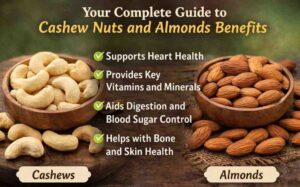
Can Dogs Eat Cashews? A Complete Guide for Pet Lovers

Introduction
Are Cashews Safe for Dogs?
Health Benefits of Cashews for Dogs
1. Rich in Healthy Fats and Protein
Cashews contain unsaturated fats that can support your dog’s skin and coat health, and protein that helps with muscle repair and energy. However, these benefits only apply when cashews are served in small portions.
2. Where to Get Minerals, You Need
Magnesium, copper, and zinc are some of the elements found in cashews. These minerals help build bones, keep your immune system strong, and make enzymes work properly. Dogs get most of the nutrients they need from a well-balanced food, but cashews can sometimes help them out.3. Natural Energy Boost
A Natural way to get more energy. Because they are high in calories and fat, cashews can give you energy quickly, which is great for working or busy dogs. However, this type of snack is not a good idea for pets that don’t move around much or who have weight problems.Risks and Side Effects of Feeding Cashews to Dogs
1. High in Fat
The main problem with peanuts is that they are high in fat. Having too much fat can make you gain weight and raise your risk of pancreatitis, an extremely painful and dangerous condition in which the pancreas becomes inflamed. Canine friends who have had pancreatitis or are overweight should not eat any nuts.2. Potential for Allergic Reactions
While rare, dogs can be allergic to nuts, including cashews. Signs of a food allergy may include:- Itching or scratching
- Swelling of the face or paws
- Vomiting or diarrhoea
- Lethargy or restlessness
3. Risk of choking or having difficulty digesting
Small dogs may choke or have stomach issues if they don’t chew whole cashews properly. Before giving cashews to your dog, it’s best to chop or crush them.4. Salt and Flavouring Hazards
Most store-bought cashews are salted or flavoured with ingredients like garlic, onion, or chili—all of which are toxic to dogs. Always use plain, unsalted, and unseasoned cashews if you’re planning to share a few with your pet.How Many Cashews Can Dogs Eat?
- Small dogs (under 10 kg): 1 cashew, once or twice a week.
- Medium dogs (10–25 kg): 2–3 cashews per week.
- Large dogs (25+ kg): up to 4 cashews per week.
Best Practices for Feeding Cashews to Dogs
- Choose plain, unsalted, and dry-roasted cashews.
- Avoid mixed nuts, as some varieties may include toxic options.
- Break the cashews into small pieces to reduce choking risk.
- Use cashews as an occasional treat, not a dietary staple.
- Introduce gradually and watch for any allergic reactions.
- Never give cashew butter unless it contains no sugar, salt, xylitol, or additives.
- Carrot sticks – low calorie, crunchy, and great for teeth
- Apple slices (no seeds) – rich in fibre and vitamins
- Plain pumpkin puree – good for digestion
- Cooked sweet potatoes – soft and nutritious
- Peanut butter (xylitol-free) – a classic, safe favourite in moderation



